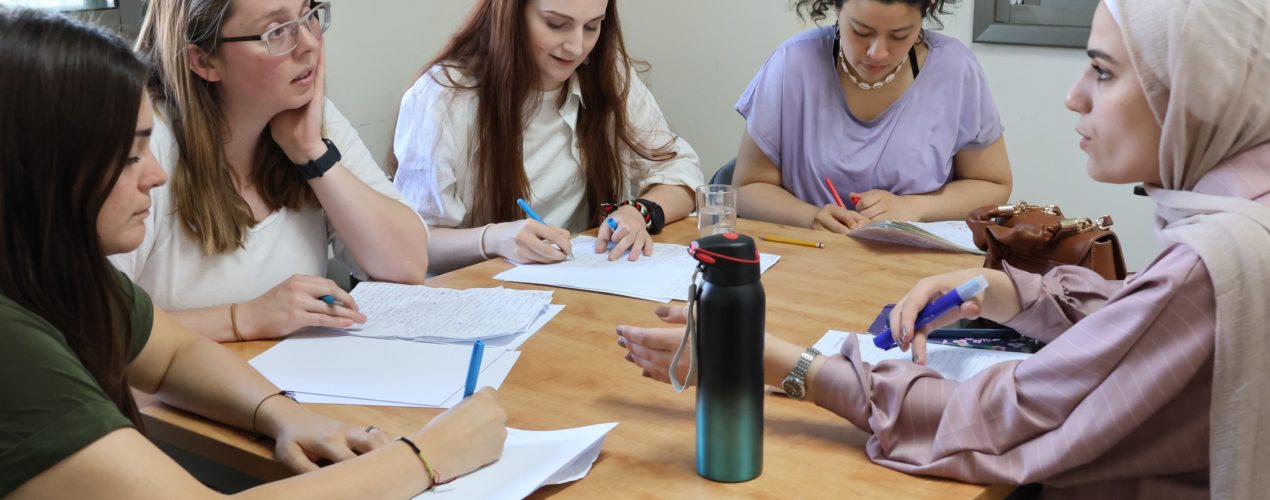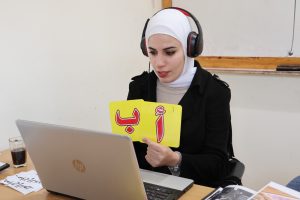Arabic is one of the fastest-growing languages in the world. In this guide by Study Arabic Language, we look at key Arabic phrases for greetings and farewells and share some top language learning tips! But why does this matter? It matters because almost anywhere you go in the world, you’ll hear Arabic being spoken. It’s a fascinating language and many people are deciding to take it up. Today, it’s considered one of the fastest-growing languages in the world. 25 countries in the world also have Arabic as an official or spoken language, so it can be useful for work, travel, and social opportunities too. Thus whatever your reasons for learning, learning some basic Arabic greetings and farewells is a good way to begin. Keep reading to learn more or take your first Arabic lessons online.
Arabic greetings
If you need to know how to say hello in Arabic, the first distinction you need to make is between religious and non-religious greetings.
Not all Arabic speakers are Muslims, however, the most common way to say hello in Arabic is the Islamic greeting “As-salamu alaikum”, which means “Peace be upon you”. The non-religious way to greet someone in Arabic would be to say “ahlan”. Both of these Arabic greetings have set responses:
| Greeting | Response | |||
| Hello (religious) | As-salamu alaikum | السلام عليكم | Wa-alaikum as-salam | وعليكم السلام |
| Hello (non-religious) | Ahlan | أهلاً | Ahlan beek | أهلاً بيك |
Greetings in Arabic are among key Arabic phrases and they change depending on the time of day. Saying “good morning” in Arabic is “sabah al kheir” and “kheir” means “goodness”. The literal translation is “morning of goodness” and the response to this would be to change “goodness” to an equally positive word, such as “flowers” or “light”.
| Greeting | Response | ||||
| Good morning | Sabah al-kheir | صباح الخير | Morning of light | Sabah al-noor | صباح النور |
| Good evening | Masaa al-kheir | مساء الخير | Evening of flowers | Masaa al-ward | مساء الورد |
As with English, the equivalent of “good night” is not often used as a greeting but rather when saying goodbye.
Formal greetings and responses in Arabic
There are both religious and non-religious ways to greet and respond to others in Arabic. Saying hello is often followed by the question “How are you?” There are several ways to say this depending on who you are speaking to.
| Greeting | Response | ||||
| How are you? | Kaefa haaluk? | كيف حالك | Good thanks (religious) | Bekheir alhamdulilah | بخير الحمدلله |
| Good thanks (non-religious) | Bekheir shukran | بخير شكراً | |||
| And you? | Wa ant? (m)Wa anti? (f) | وأنت؟ | |||
Informal greetings and responses in Arabic
There is an exhaustive list because each dialect of Arabic has a different way of saying this but here are some examples:
| Greeting | Response | |||||
| Levantine Arabic | How’s it going? | Keefak? | كيفك؟ | I’m fine | Mneeh (m)Mneeha (f) | منيح |
| Egyptian Arabic | Akhbarik eeh? | أخبارك إيه؟ | Kwayis (m)Kwayisa (f) | كويس | ||
Arabic basic phrases
Beyond the first encounter, you will want to learn more ways of interacting with your Arabic-speaking counterparts. You’ll need to be polite, saying thanks and even apologizing at times. Later, you’ll also need to be able to ask some basic questions in Arabic. So let’s dig in.
Saying thanks and responding
| Phrase | Response | ||||
| Thank you | Shukran | شكراً | You’re welcome | Afwan | عفواً |
| Thank you very much | Shukran jazeelan | شكراً جزيلاً | |||
| May god reward you (religious) | Jazakallah kheir | جزاك الله خير | And you | Wa iyak kheir | وإياك خير |
With family and friends, it is common to say “min eyooni” instead of “afwan”. It means “from my eyes”.
Apologizing in Arabic
These Arabic words and phrases for apologies increase in intensity. You may use the first when trying to get past someone in the street or if you didn’t hear what someone said. However, the latter two are for apologizing for something you did wrong. “Samahni” in particular is quite formal and used if you have offended someone.
| Phrase | Response | ||||
| Excuse me / pardon me | Afwan / lo samaht | عفواً / لو سمحت | Forgiveness | Al-afuw | العفو |
| Sorry | Asif | أسف | No worries | Hasal kheir | حصل خير |
| Forgive me | Samahni | سامحني | |||
Basic questions
Now that you’ve mastered a few first, key Arabic phrases you’re going to be eager to dive deeper. Here are some basic questions to get to know someone better, and a couple that might make your life easier when traveling in an Arabic-speaking country.
| Phrase | Response | ||||
| What’s your name? | Ma huwa ismuk?Shu ismuk? (informal) | ما هو اسمك؟شو اسمك؟ | My name is… | Ismee… [name]Ana…[name] | إسمي… أنا … |
| Where are you from? | Min aina ant?Inta min ween? (informal) | من أين أنت؟إنت من وين؟ | I am from… | Ana min… | أنا من… |
| Do you speak another language? | Hel tatakalum lugha ukhra? | هل تتكلم لغة أخرى؟ | Yes, I speak…No, sorry. | Na’am, itakalam…La, asif. | نعم، أتكلم… لا، أسف. |
| Pardon me, where is the restroom? | Lo samaht, ain al hamam? | لو سمحت، أين الحمام؟ | There | Hunak | هناك |
| How much is this? | Bikam hatha? | بكم هذا؟ | ` | ||
Arabic farewells
There is also a religious and non-religious way of saying goodbye in Arabic. It is worth mentioning that ”ila al liqaa” is not often used since it is very formal. It means “until we meet again” and is only heard on news programs or in Modern Standard Arabic cartoons.
Unlike saying hello, responses to saying goodbye are often the same as the greeting and can be used interchangeably.
| Greeting and response | ||
| Bye (religious) | Fi aman illaAllah ma’ik | في أمان اللهالله معك |
| Bye (non-religious) | Ma’assalamaIlla al-liqaa | مع السلامةإلا اللقاء |
| Goodnight | Tisbah ‘ala kheir | تصبح على خير |
Etiquette in Arabic countries
Arabic is a language that places a lot of importance on etiquette and politeness. In Arab culture, between friends and family, this is less important than with strangers and superiors, but even then there are still certain rules.
This is not always reflected in language and there are several common gestures. For example, it’s common to stand up when someone enters the room or wait until the host is sitting at the table and invites everyone to start eating.
Referring to elders in Arabic is important. Usually, first names are not used unless you are told to or you are a similar age and familiar with someone. Formally, you can refer to someone as the “Parent of” their eldest child, and informally you can call them aunt or uncle.
To an elder or a stranger, you might use the formal pronoun “hadartik”. For example, “meen hadartik” is a polite way of asking “Who are you?” This is particularly common to use while speaking on the phone to ask who is calling.
| Phrase | ||
| Please | Min fadlek / lo samaht | من فضلك / لو سمحت |
| Welcome | Ahlan wa sahlan | أهلاً وسهلاً |
| Please come in / please help yourself | Tfadel (m)Tfadelee (f) | تفضلتفضلي |
| Mother of… / Father of… | Umm… (f) / Abo…(m) | أم… / أبو… |
| Auntie / uncle | Auntie/Uncle | خالة / عام |
| Formal pronoun | Hadartik | حضرتك |
Our Success So Far
Since 2011, Study Arabic Language has welcomed visitors from all around the world.
Study Arabic Language has been offering Arabic courses for non-native speakers since 2011. Throughout the years, we have been developing many Arabic immersion programs and online courses. We use the most advanced teaching methods which we develop and enhance year after year. Education is an active process that is always advancing, and you will be part of the development.
Despite continuous program improvements for the best learning experience, our core goal remains: connecting, teaching, and developing individuals. Additionally, we aim to promote and encourage exchange in the local and international communities.
We continue to strive towards excellence:
In 2022, we ranked as “one of the top three organizations worldwide in offering volunteer opportunities”. We also ranked as “one of the top three language schools worldwide” by Go Overseas. We also received a total of five Go Overseas Community Choice Awards. Among others, Study Arabic Language earned recognition as one of the top Teach Abroad Providers for the category of “benefits”. Besides that, we were also one of the Top Internship Abroad Providers for the categories of “growth” and “support”.
In 2021, we were one of the top three volunteer programs in the world. Go Overseas awarded us the community choice awards in the categories of “best language school”, “fun”, and “teaching”.
In 2019, we received our inaugural “Go Overseas Community Choice Awards”. This award was a recognition of Study Arabic Language’s positive effect on the global travel community. You can check our ratings below.
- +748 Reviews and ratings (96.8%) on gooverseas.com
- +160 Reviews and ratings on goabroad.com
- Participants’ video testimonials
Conclusion
Mastering these key Arabic phrases and basic Arabic greetings is an essential first step on your journey to learning the language. By equipping yourself with these foundational elements, you can begin to hold polite conversations and interact meaningfully with Arabic-speaking people. This initial effort will open doors to new knowledge, offering insights into a fascinating culture and presenting untold opportunities for personal and professional growth. Embrace the adventure of learning Arabic, and you will find yourself rewarded with richer experiences and deeper connections wherever your travels take you.
Tags: Arabic conversational phrases Palestine, Arabic greetings guide Palestine, Arabic hello phrases Palestine, Arabic introduction phrases Palestine, Arabic welcome expressions Palestine, basic Arabic phrases Palestine, essential Arabic greetings Palestine, key phrases for Arabic welcome in Palestine, learning Arabic greetings Palestine, Palestine Arabic greetings, Palestine Arabic language basics, Palestinian Arabic greetings, polite Arabic phrases Palestine, warm Arabic welcome phrases Palestine

